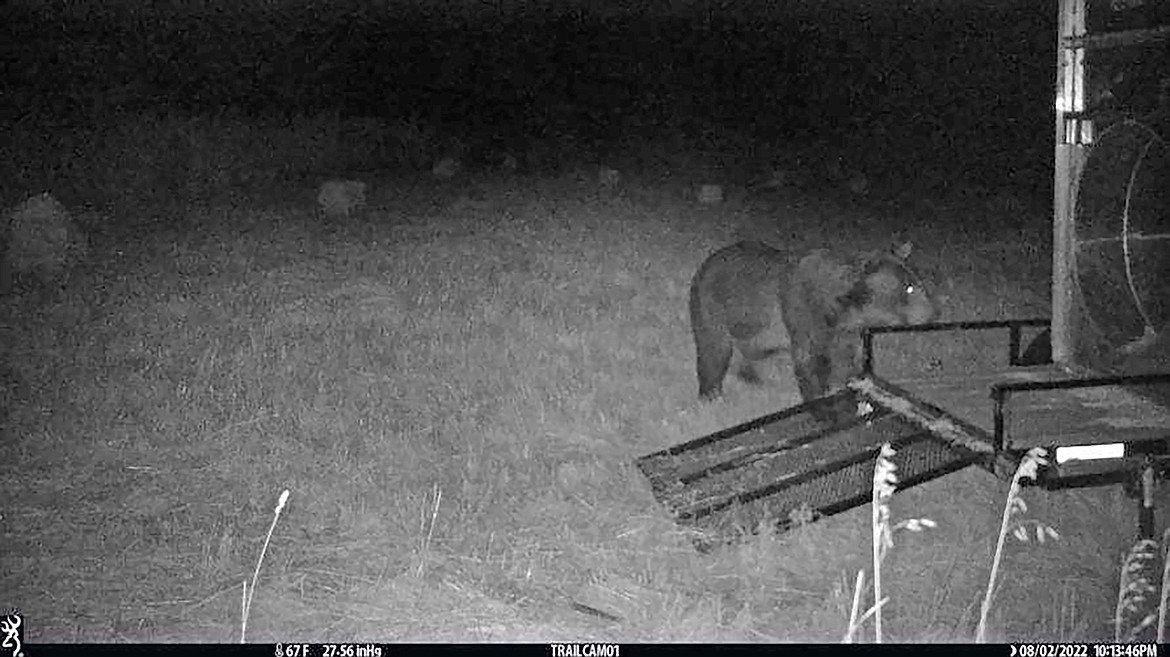Grizzly euthanized after recent livestock attacks
▶️ Listen to this article now.
PORTHILL — A grizzly bear behind recent attacks on livestock in the area has been euthanized.
Idaho Fish and Game officials, in cooperation with the U.S. Fish and Wildlife Service, euthanized the large adult male grizzly bear in Boundary County near the town of Porthill.
Grizzly bears in Idaho are federally protected under the Endangered Species Act, so any management action is done in consultation with the U.S. Fish and Wildlife Service.
There has been a series of livestock losses due to grizzly bears this spring and summer, T.J. Ross, regional communications manager for Idaho Fish & Game, said in a press release.
The decision was made following a Tuesday attack on a half-dozen sheep near Porthill. Four of the animals were killed and another two injured. Upon further investigation by IFG conservation officers, the bear was confirmed to be a grizzly.
Traps were set to capture the bear that night, but although the bear returned to the area, Ross said the bear did not enter the trap. However, the bear did kill an additional sheep on Wednesday, Aug. 3.
The traps remained set and all additional livestock were corralled in a temporary electric fence to try and prevent additional livestock loss, Ross said.
The bear again returned overnight Wednesday and, this time, was successfully trapped.
"Due to the bear’s repeated behaviors of killing livestock within close proximity of a home, the bear was euthanized after it was captured," Ross said in the press release. "The decision was made with consideration for the safety of people and property."
The August attacks were the latest in which residents in Bonner and Boundary counties lost livestock to grizzly bears.
On June 28, a domestic pig was killed by a grizzly bear near Elmira and the following night, four goats were killed on a nearby property. While the species of the bear responsible for June 29 attack could not be confirmed, IDFG officials said last month that “given the close proximity to the previous attack, it is likely the same grizzly bear.”
The Bonner County attacks follow a Boundary County incident in which a domestic pig was killed by a grizzly near Good Grief just south of the Canadian border on June 24.
Neither the location in Good Grief, just south of the Canadian border, on June 24; nor the locations in Elmira on June 28-29 had electric fences. Almost all incidents with bears and livestock are due to no electric fence and feed being left out.
"Bears learn behaviors quickly, especially related to gaining access to easy food sources," Ross said. "The series of grizzly bear and livestock encounters in North Idaho this spring and summer is a reminder of that."
In the wake of the recent livestock attacks, IDFG officials said it is important for farmers and hobby farmers to understand the necessity of electric fences to keep out predators.
In addition, attractants such as trash, animal carcasses, compost, food and beehives should also be properly disposed of. Food and pet food should be securely stored in a bear-resistant location and pet food should be secured.
Outdoor recreationists should also be bear aware, taking care not to interrupt bear activities, and not hiking alone. Bear spray should be carried at all times and residents should take time to learn the difference between defensive and predatory encouters — and how to respond in each situation.
Two IFG employees are largely dedicated to grizzly bear management and education in the region.
"The positions exist to respond to grizzly bear-human conflicts, work with landowners to prevent future bear conflicts and provide bear education and outreach," Ross said. "Both positions are based out of Boundary County, and as part of their program, supplies and support can be provided to the public for grizzly bear-human conflicts."

